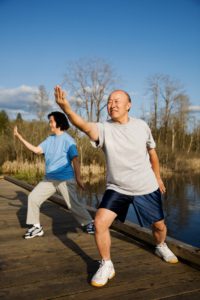
Most people know that being active and exercising is good for one’s health. Getting enough exercise has many benefits that help people feel good and live healthier lifestyles. Those who suffer from chronic pain they are afraid to exercise because they fear the session will lead to more pain. Researchers set out to determine if a single exercise session leaves those with chronic pain feeling worse.
The findings are published in the October 2022 issue of Musculoskeletal Science & Practice [1]. The systematic review and meta-analysis included 17 trials that shared findings about the impact of a single exercise session on the pain intensity of adults with chronic pain.
Like what you’re learning? Download a brochure for our online, postgraduate pain medicine certificate or master’s degree program in partnership with the Keck School of Medicine of USC.
The research found no significant differences in the pain intensity seen immediately after exercise and even an hour afterward between those with chronic pain and the control group. They concluded that an individual exercise session didn’t lead to an increase in pain intensity and didn’t reduce the pain intensity.
This is essential information for those with chronic pain who avoid exercise out of fear that it will increase pain intensity. It’s also crucial for those who work with chronic pain patients to share the knowledge to encourage people to move past the fear. In doing so, they may be able to gain many health benefits.
Those who avoid exercising due to chronic pain fear are likely missing out on the many health benefits it can provide. According to the Centers for Disease Control and Prevention (CDC), it can help improve brain health, manage weight, reduce risks of diabetes, strengthen bones and muscles, and improve the ability to do daily activities [2].
When it comes to a single exercise session, the CDC reports that there are benefits as well. They report that there are brain health benefits immediately following an exercise session, including reducing anxiety. Further, the CDC reports that regular physical activity can help people reduce pain, especially those with arthritis.
Those with chronic pain and fear exercising may want to consider the many benefits regularly engaging in it may provide. They may find that it helps reduce pain, improve movement and sleep, and offer myriad other health benefits that make moving past the fear well worth the effort.
Earn an Online Postgraduate Degree in Pain Medicine
Like what you’re learning? Consider enrolling in the Herman Ostrow School of Dentistry of USC’s online, competency-based certificate or master’s program in Pain Medicine in partnership with the Keck School of Medicine of USC.
Source:
- Musculoskeletal Science & Practice. Effects of a single exercise session on pain intensity in adults with chronic pain. October 2022.
- Centers for Disease Control and Prevention. Benefits of Physical Activity.
This article was originally published on Confronting Chronic Pain by Dr. Steven Richeimer, Director Pain Medicine Master and Certificate.
